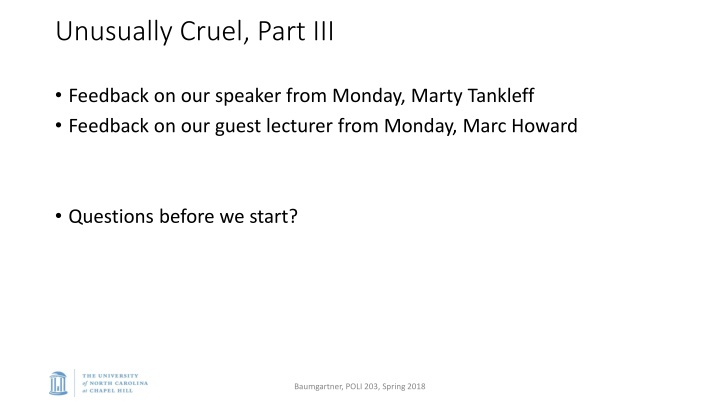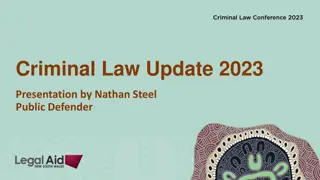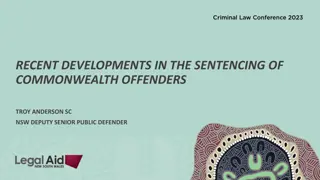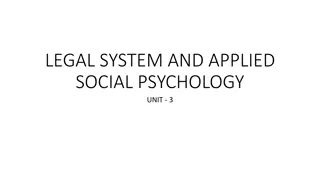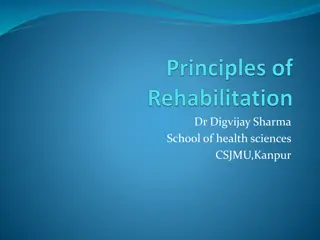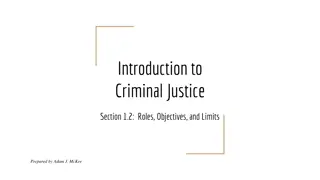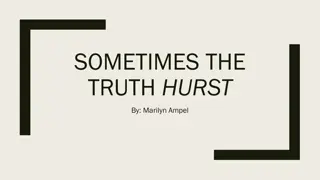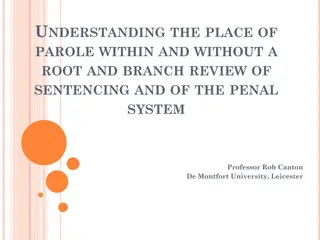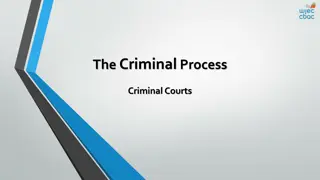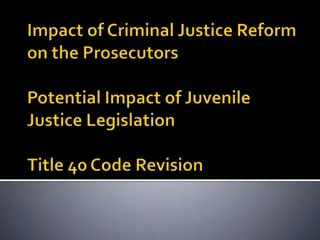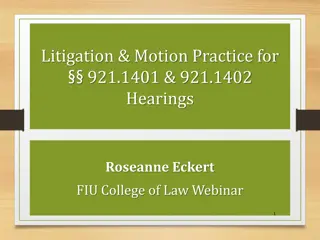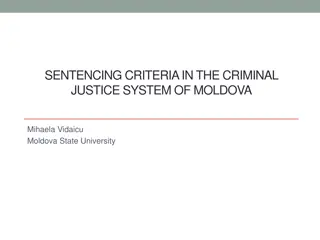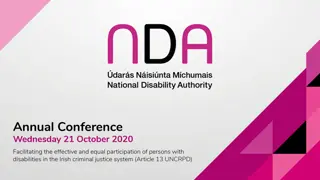Comparative Perspectives on Sentencing and Rehabilitation in Criminal Justice Systems
Exploring the historical context and current practices in sentencing and rehabilitation within criminal justice systems, the discussion covers topics such as the evolving forms of sentencing in the US, the impact of drug sentencing in Portugal, disparities in punishment among different countries, prison conditions and the use of solitary confinement, challenges in rehabilitation efforts highlighted by the Martinson Report, and varying approaches to rehabilitation in France, Germany, and the UK.
Download Presentation

Please find below an Image/Link to download the presentation.
The content on the website is provided AS IS for your information and personal use only. It may not be sold, licensed, or shared on other websites without obtaining consent from the author.If you encounter any issues during the download, it is possible that the publisher has removed the file from their server.
You are allowed to download the files provided on this website for personal or commercial use, subject to the condition that they are used lawfully. All files are the property of their respective owners.
The content on the website is provided AS IS for your information and personal use only. It may not be sold, licensed, or shared on other websites without obtaining consent from the author.
E N D
Presentation Transcript
Unusually Cruel, Part III Feedback on our speaker from Monday, Marty Tankleff Feedback on our guest lecturer from Monday, Marc Howard Questions before we start? Baumgartner, POLI 203, Spring 2018
Forms of sentencing used in the US, historically Indeterminate Determinate Structured Mandatory Baumgartner, POLI 203, Spring 2018
Drug sentencing Portugal completely legalized after their dictatorship was replaced with a democracy in 1974 Several years of bad outcomes, basically lots of heroin addicts moved there, bad things occurred After a period of settling down, crime is reduced, drug use is not on the rise, etc. What SHOULD BE the penalty for: Sale of drugs Use of drugs Baumgartner, POLI 203, Spring 2018
In every case: US>UK>F>D What the heck? Why is the same crime punished more? Also, a historical trend in the US from lower to harsher punishments, for the same crime. Drugs in particular. Explanations? Racial diversity? Othering? Baumgartner, POLI 203, Spring 2018
Prison conditions US: Overcrowding, violence, etc. US: Solitary confinement routinely used as punishment / control (See today s New York Times for a case from Mississippi https://www.nytimes.com/2018/04/03/us/mississippi-private-prison- abuse.html How does this compare to the other systems? Why is this? Baumgartner, POLI 203, Spring 2018
Rehabilitation The 1974 Martinson Report It s huge impact, coming at a time when the audience was ready to throw away the key It s retraction was never noticed. Re-offending rates increasing in the US Baumgartner, POLI 203, Spring 2018
Comparative Perspectives on Rehabilitation France: home visits for 3-10 days Look for a job before release Family illness / death Maintain social connection Germany: No short prison terms at all (< 6 months; community service / probation) Job training / individualized re-integration plan UK: in between US and Continental model Baumgartner, POLI 203, Spring 2018
Parole US in the 1970s, 70% of all released from prison were on parole Today: typical release is expiration of sentence See Figure 6.4, wow. Reasons for decline in parole: mandatory sentencing, change in nature of parole boards, increasingly violent and overcrowded prisons (makes inmates less likely to take advantage of parole), politics of parole, growth in long sentences w/o parole Baumgartner, POLI 203, Spring 2018
Early release in other countries France: Conditional liberty (ankle bracelet, regular meetings with officials ) Reduction of penalty (after of time served, regular meetings to show one has a plan to re-integrate, inmate (and lawyer) make the case they have paid their debt and are ready to be productive) Compassionate release (e.g., age, illness) Germany: Eligible for release after 2/3 of sentence served; first-time offenders of sentence; juveniles 1/3 time; life means 15 years, discretionary release UK Similar to Germany on this question Baumgartner, POLI 203, Spring 2018
Social Re-entry What are / should be the restrictions on: Voting Employment (child sex offenders can t work at a day care; financial fraudsters can no longer be accountants ) Housing Voting No restrictions even while in prison (Maine, Vermont) Rights immediately restored on release from prison (14 states) Restored after parole completed (4 states) Excluded for those on felony probation (even if not incarcerated) (18 states) Even longer restrictions, post-incarceration, including lifetime bans (12 states) Number excluded from voting: <1.2m in 1976; > 6m in the 2016 presidential election Baumgartner, POLI 203, Spring 2018
Lets explain these differences Race Religion Politics Business Baumgartner, POLI 203, Spring 2018
